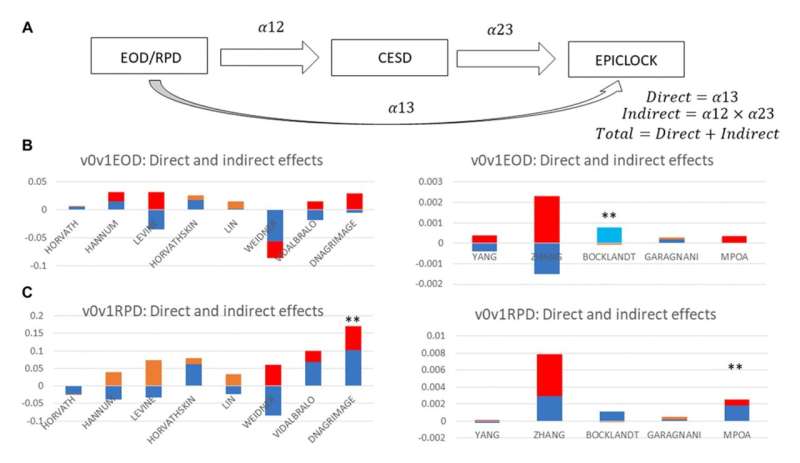Examining epigenetic clocks and their association with perceived discrimination and depressive symptoms

A new research paper was published in Aging entitled, "Epigenetic clocks and their association with trajectories in perceived discrimination and depressive symptoms among US middle-aged and older adults."
According to the paper, "perceived discrimination may be associated with accelerated aging later in life, with depressive symptoms acting as potential mediator."
In this recently published study, researchers May A. Beydoun, Hind A. Beydoun, Nicole Noren Hooten, Ana I. Maldonado, Jordan Weiss, Michele K. Evans, and Alan B. Zonderman from the National Institute on Aging's Intramural Research Program, Fort Belvoir Community Hospital, University of Maryland, and the University of California Berkeley examined a nationally representative sample of 2,806 older U.S. adults. The team evaluated associations of perceived discrimination measures with 13 DNA methylation (DNAm)-based measures of epigenetic aging. They used group-based trajectory and four-way mediation analyses.
"Here we examined retrospective data from the HRS [Health and Retirement Study 2010–2016] cohort study of U.S. adults aged 50–100 years and investigated measures of perceived discrimination and depressive symptoms in relation to 13 different DNAm-based epigenetic clocks (EPICLOCK) age-estimators."
Overall, and mostly among female and Non-Hispanic White (NHW) participants, greater reasons for perceived discrimination (RPD) had a significant adverse total effect on epigenetic aging: 20–50% of this effect was explained by a pure indirect effect through depressive symptoms (DEP). Sustained, elevated DEP among females was associated with greater LIN DNAm age, patterns observed for elevated DEP (high vs. low) for GrimAge and MPOA DNAm markers. Overall and in White adults, the relationship of the Levine clock with perceived discrimination in general (both experience of discrimination (EOD) and RPD) was mediated through elevated DEP.
In conclusion, sustained elevations in DEP and RPD were associated with select biological aging measures, consistently among women and White adults, with DEP acting as mediator in several RPD-EPICLOCK associations.
"In sum, sustained elevations in depressive symptoms and reasons for perceived discrimination were associated with select measures of epigenetic aging, consistently among women and NHW adults. Furthermore, depressive symptoms acted as potential mediator in the perceived discrimination-epigenetic clock association in most 4-way decomposition models with detected total effect in which perceived discrimination was linked to accelerated epigenetic age."
More information: May A. Beydoun et al, Epigenetic clocks and their association with trajectories in perceived discrimination and depressive symptoms among US middle-aged and older adults, Aging (2022). DOI: 10.18632/aging.204150




















